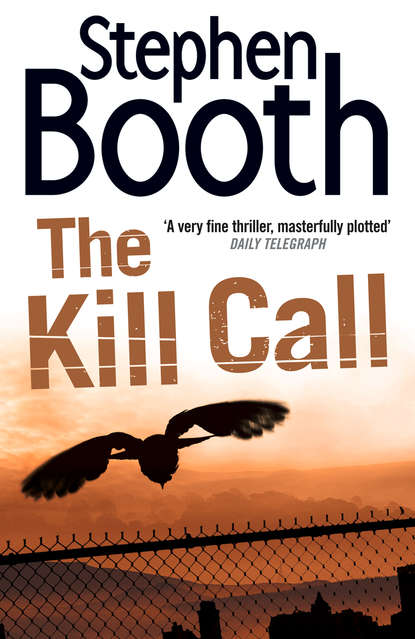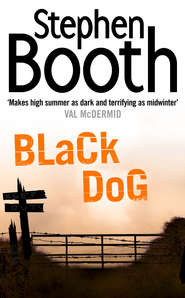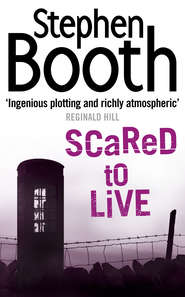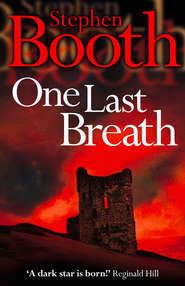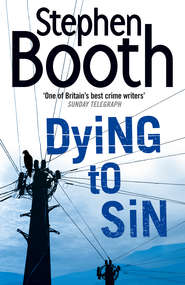По всем вопросам обращайтесь на: info@litportal.ru
(©) 2003-2024.
✖
The Kill Call
Автор
Год написания книги
2019
Настройки чтения
Размер шрифта
Высота строк
Поля
Fry made her way to the door, under the impression that her DI had drifted away into some strange seminar-like world of his own, all whiteboards and overhead projectors, with a spicing of motivational role-play.
‘Witnesses,’ said Hitchens suddenly.
‘What?’
‘The sixth lottery ball. Motive, means … and witnesses. That’s what you need, some potential witnesses.’
‘I’ve got a whole posse of them,’ said Fry. ‘But without enough bodies available, it’s impossible to question them all. By now, they could have got their stories straight, anyway.’
Fry turned the Peugeot off Castleton Road into Grosvenor Avenue and pulled up at the kerb outside number 12, a once prosperous, detached Victorian villa nestling behind mock porticos. Her flat was on the first floor – a bedroom, sitting room, bathroom with shower cubicle, and a tiny kitchen area. Strangely, the first floor was regarded as the high-status part of the house, poised between the noisier ground-floor flats and the tiny bedsits in the old servants’ quarters on the top floor.
Directly beneath her was a flat full of students. She wasn’t quite sure how many of them shared together – three, perhaps four. The number probably changed from week to week, for all she knew.
When she’d first moved into number 12 Grosvenor Avenue, all the other occupants had been students, most of them studying at High Peak College on the west side of town. But in the past year or two, there had been a gradual population shift, with the students packing their rucksacks and heading for smart new accommodation in the halls of residence that had opened on the college campus. Their replacements seemed to be migrant workers of various nationalities. Many of them were as young as the students, but they were out all day, and often all night, working in hotels and restaurants around Edendale.
Fry took off her jacket and shoes and collapsed on her bed. She must have a shower, or she might never feel human again.
Cooper arrived at Welbeck Street gasping for a coffee. He felt as though he hadn’t taken a dose of caffeine all day; the briefing before the raid on the cannabis factory seemed so long ago now.
He knew he drank too much coffee when he was at home on his own. He never used to do that – it was a habit he’d developed when he moved out of Bridge End Farm into Welbeck Street. It had begun only gradually, just as something to occupy his attention for a few minutes, spooning the granules from a jar of Nescafé, fetching the milk, filling up the kettle. The routine seemed to take just enough time for the feeling of loneliness to pass. He was deflecting an undesirable emotion with a series of routine actions, switching the brain to a safe little rut.
Cooper went out into the conservatory to see where Randy had got to. The cats at Welbeck Street had been his landlady’s pets originally – or, at least, they’d been strays that Dorothy Shelley had taken under her wing and fed whenever they decided to turn up. He’d inherited one of them with the flat – a furry black object who still came and went whenever he felt like it. He didn’t know how old Randy was, but it was obvious that he was approaching his later years. He was very stiff when he moved, which wasn’t often, and he continued to lose weight, no matter how much he ate. Finally, Cooper noticed one day that the cat was becoming incontinent. Despite his nomadic habits, he had always been a very clean animal, and his condition clearly bothered him.
‘Sorry, old chap,’ he said. ‘It looks like another trip to the vet.’
Mrs Shelley hadn’t been well recently, either. It seemed unkind, but Cooper had begun to wonder who would inherit the two adjoining houses in Welbeck Street if and when she should die. She never talked about any children, and rarely had visits from family members, except once a nephew and his wife. The nephew had looked a bit shifty to Cooper, had given the properties too much of a proprietary examination from the street before he went in. But he was probably worrying unnecessarily, and far too early. Despite the casualness of the agreement when he’d moved in, he must have some security of tenancy.
Besides, Dorothy Shelley was the sort of woman who would go on forever – never too strong and always a bit vague, but tottering around long after younger people had given up the ghost. He hoped that was the case. He’d got quite fond of her, in a way. Apart from the question mark it might put over his own future, he’d be sorry to lose her. And he certainly didn’t want to see her being taken advantage of by some greedy nephew who didn’t care one jot about her.
But then, knowing Mrs Shelley, the problem would never arise. She had probably made a will leaving her entire estate to Cats Protection anyway.
In her sitting room, Mrs Shelley had a stuffed barn owl, so old and fossilized that Cooper could have used its beak as a bottle opener. He’d come to think of his landlady as a bit like that stuffed owl. Rather bedraggled and slightly moth-eaten around the pinions, but likely to last for ever, so long as it was valued.
Cooper looked around the conservatory. At the far end, there were so many cobwebs that the spiders would soon be complaining about overcrowding. He needed to make time for a spring clean. He needed to find time for Liz, too, or she’d be complaining he neglected her. He was supposed to have made time for a holiday.
But time was always a problem. For him, and for Randy, there was never enough of it.
Strange how complications seemed to mount up in your life as you got older. In his twenties, everything had seemed very simple. Now, within a few years, he felt as though the world was on his shoulders some days. Was it the creeping infection of responsibility? He had a steady relationship now. He’d been going out with Liz Petty, a civilian crime-scene examiner at E Division, for several months. He ought to be getting to know her fairly well by this time.
And then there was that old, vexed question of promotion. It had come up in conversation with Liz the other night. Over a glass of white wine and a Bondi Chicken in the Australian Bar at Bakewell, she’d gently quizzed him about his future. Cooper never found it difficult to listen to Liz. She didn’t take herself too seriously, and might burst out laughing at him at any moment. He treasured those moments, as a rule. But that evening, she’d been more serious.
And she had been right, he supposed. It was now or never, if he was ever going to go for promotion. Even if it meant some kind of horizontal development, a move to a different speciality – whatever it took to get noticed. You couldn’t stand still, or you moved backwards in this world. If he was going to settle down one day and have a family … Well that, after all, was what he would do, wasn’t it? If he was going to settle down, he couldn’t spend his life on a DC’s salary, growing cynical and grumpy, like Gavin Murfin. Putting on weight in all the wrong places, too, probably. Oh, damn.
His mother had always talked so much about her grandchildren – not only those who already existed, but those that were in the future, yet unborn. They had been the most important thing in her mind in those final years, even when the illness had taken most of her memories. Matt had done that for her, the older brother fulfilling the hopes and dreams. But Ben knew he had failed her. Maybe there was still time to make up for it, though. Still time to tell her that he had settled down, got the promotion, produced those grandchildren she’d talked about. He felt sure she would know, even now, wherever she was. If it mattered enough, you could make it happen.
8 (#ud3157305-6884-5400-ad2c-ccfd653500d5)
Fry woke with a fuzzy head, and looked around her in confusion. She’d only lain down on her bed for a few minutes to rest, but she must have dropped off to sleep almost straight away. It had been a busy day, but not that bad. There had been many days when she’d put in much longer hours, when the time to go home never seemed to arrive. There could be a few of those days to come, depending on the course of this new enquiry. But not today. Today had been … well, average. There was no reason she should feel so tired and groggy, unless she was coming down with something. And that was the last thing she needed.
She sniffed. The smell of soy sauce was drifting up from the flat downstairs. It was one of those smells that seemed to be able to penetrate floors and carpets with surprising ease, as if its spicy aroma could wind its way through the cracks of the floorboards like wisps of smoke.
One day, it had dawned on her that she had plenty of money in her savings account. A police sergeant’s salary was perfectly adequate, and there were hardly any major expenses in her life, except for her car and the rent on this flat. Not exactly a lavish lifestyle, was it? Fat chance of that. She ought to be able to think of something she could do with her savings.
Fry made her way into the kitchen and looked at the washing up. There wasn’t much of it, not now that she was on her own again, her sister Angie having headed back to Birmingham and whatever sort of lifestyle she led there. So those few plates and pans shouldn’t look quite so daunting, sitting there in the sink in that squalid, disapproving way.
What to do with a few thousand pounds? She supposed she could put a deposit down on a house and take out a mortgage. It was the sort of thing that everyone else seemed to do. They’d all tied themselves up in property and debts by the time they got to her age.
Fry hissed between her teeth. A mortgage? She’d rather be chained in purgatory, with eagles pecking at her liver.
She showered, changed her clothes, then pulled on her coat and went out for a walk to wake herself up. The clouds had cleared now, and a crescent moon was shining on the wet street. Music played behind curtained windows as she passed. Tunes that were vaguely familiar, but she couldn’t quite hear enough of to name.
She felt like the only person out in the streets tonight. The rest of Edendale was shut up behind its doors and windows, people enclosed in their own little worlds. Sometimes she wished she had a world of her own that she could enter that way, instead of always standing out in the cold, feeling so small and vulnerable under a vast, moonlit sky. At times like this, she craved the crowded intimacy of the city.
After a few months, Fry had finally brought herself to make an effort at getting acquainted with the students. So what if they had nothing in common? She wasn’t going to spend the rest of her life with them. But then they had all left. They’d moved away to live in student halls, or had finished their courses and got on with their lives. It was strange how everyone she moved towards always seemed to move away from her. It was as if she was caught up in some old-fashioned dance where no one was supposed to get too close, everyone spinning constantly round the ballroom floor, touching briefly before whirling away to a distant corner where she never saw them again.
She thought of Ben Cooper. The one person, perhaps, who had never entirely drawn away. She wasn’t sure whether that was a good thing, or not. It had been so typical of him to turn up at the crime scene on Longstone Moor today. She remembered the moment she’d spotted Cooper approaching the outer cordon – an unmistakable figure striding effortlessly up the slope towards her, shrugging off the wind and rain as if he was a natural part of the landscape, a creature totally at home in its own environment. He always looked vaguely windswept, even in the office, with that infuriating lock of hair that fell across his forehead. Yet he also radiated a kind of intensity that Fry rarely saw in anyone, let alone the police officers and other professionals she worked with day in and day out, people trained to say exactly the right thing in all circumstances. You could rely on Ben Cooper not to do that, at least.
Fry sighed. Of course, Cooper had been right about her antipathy to hunting. She didn’t think it was just some kind of class thing, though. At least, she hoped it wasn’t. Though hunting was often associated with class privilege and social hierarchy, there had always been a lurking violence at the heart of the sport that turned it into a kind of blood ritual.
When she was a studying at UCE, there had been fellow students who had been deeply involved in animal rights protests, including the campaign against fox hunting. Some of them were the sort of people whose instinct was to be anti everything, but the propaganda had been pervasive, the leaflets handed out, the posters of mutilated animals pinned to the notice boards in the Students’ Union.
To Fry, it had been obvious that the demand for a ban on fox hunting in Britain had as much to do with class politics as a love of animals. As any eighteenth-century farm labourer transported for killing a hare could have told you, the hunt was always about the relative status of human beings.
The impression most people had of fox hunting came from its depiction in art. There, hunting had always been portrayed as the preserve of the few, a jealously guarded conspiracy.
There was a painting Fry had seen in the National Gallery once, on a visit to London. A portrait of Lord Somebody or Other, Master of the Hounds. He had been painted dressed in a black hunting outfit, his dark shadow accompanying him in the background, like the spectre of death. His boots had been polished to a high gloss, and he gripped the silver handle of a riding crop as though he was just about to thrash a servant rather than his horse. To the observer, his expression suggested that he was regarding an incompetent groom who’d just dropped a brush.
When Fry had studied the label, she realized that his lordship must have been perfectly happy to appear arrogant and potentially violent, since he had given the portrait to the National Gallery himself. Hunting art had always been frank about the cruelty of the sport. These days, everything was about presentation and image. Would there have been the same demand for a ban if hunting had a better image in art?
Yet every stately home and every country pub still had hunting prints rotting from their frames. That bloody symbolism survived.
Cooper stepped outside into the back yard at Welbeck Street, and turned his face up to the rain, wiping a spatter of water from his face. On Sunday, it had been raining at the National Memorial Arboretum, too. Trickles of water had formed on the memorial at the end of The Beat, streaking the surface of the stone. They looked so much like tears that even Matt Cooper had been silenced by the symbolism. Ben had pulled up his collar, hunched his shoulders inside his coat, and regretted ever agreeing to come.
‘They’ve done it nicely, though,’ Matt had said. ‘Good job.’
‘Yes, nice.’
Claire gave Ben an odd look then. What was that look supposed to mean? Ben could never really understand what his sister was thinking, the way he could with Matt. Did she share his own reaction? Did their brother’s hearty matter-of-factness have the same effect on her – that sinking feeling of grief and loss that was rammed home by the simple act of watching someone read an inscription on a plaque?
Yes, they’d done it nicely. Written their father’s final epitaph in a few strokes of engraving. Sergeant Joseph Cooper, Derbyshire Constabulary, killed on duty. Recorded for ever. Permanently set in stone.
‘There are so many,’ said Claire. ‘You don’t realize, do you?’
Ben had gazed around the site at all the memorials to hundreds of thousands of service personnel who’d died for their country. Surely one police sergeant who had been kicked to death by drunken yobs on the streets of Edendale was a unique individual, even among so many deaths?
A few months ago, Ben had been asked to join an organization called COPS, one of those convenient acronyms that police services across the country were so fond of. Its initials stood for Care of Police Survivors. Last July, he’d attended their annual service of remembrance, complete with a fly-past by a police helicopter and a cavalcade of motorcycles ridden by the Blue Angels.
He’d come away from that service with mixed feelings. Some parts of it had been moving, like the sight of so many other relatives of dead police officers. But he wasn’t so sure about the idea of turning the occasion into a spectacle, as if it was the Edinburgh Tattoo. People grieved in different ways, he supposed. Some preferred to remember their loved ones in a public way, rather than confine their feelings to private grief. Yes, emotions were sometimes easier to deal with in public, when people felt the necessity to behave properly, and not to be an embarrassment.





